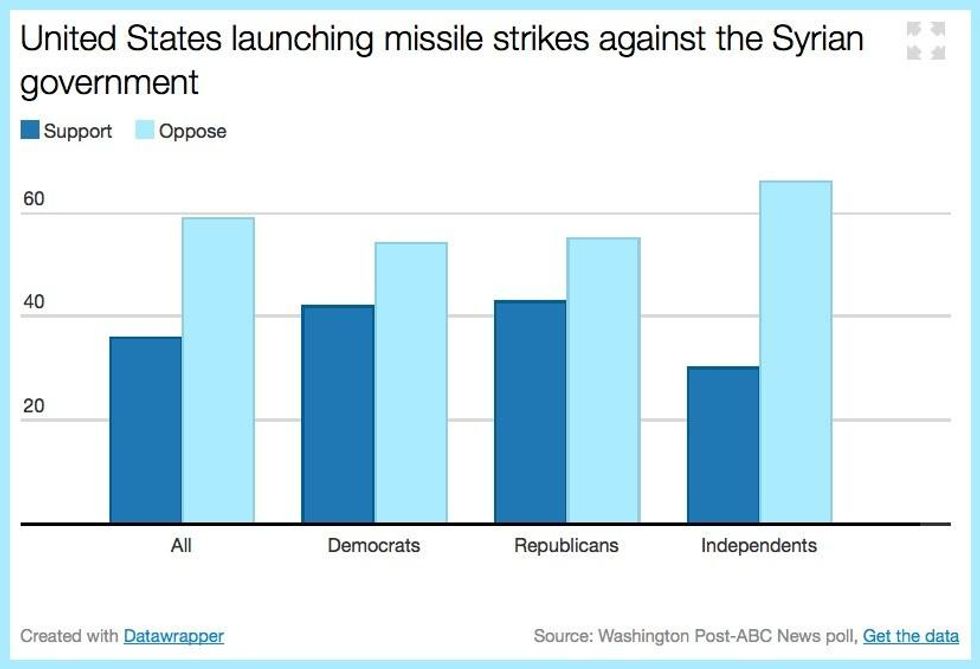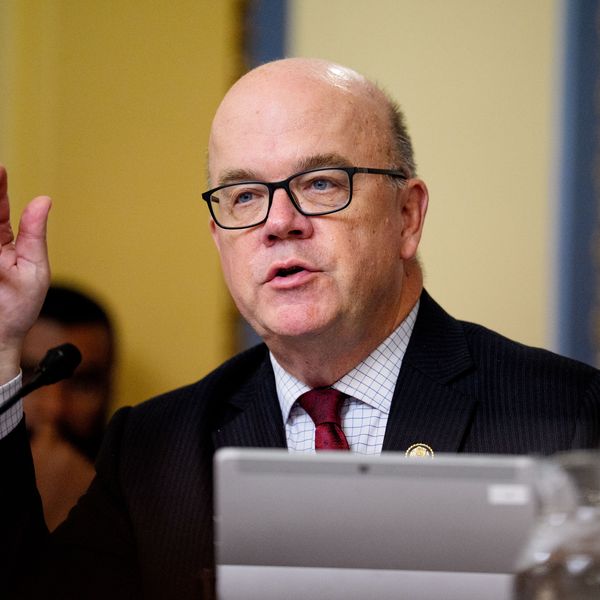Americans Don't Want War as Obama, Congress Push for War
Latest poll show numbers show consistency of US public's resistance to military attack on Syria

The continued opposition to war by the public continues even as the Obama administration, a growing swath of Congress, and a pliant media shroud military action against the Middle East country in a veil of inevitability.
According to the latest figures from an ABC/Washington Post poll, "nearly six in 10 oppose missile strikes" against Syria despite the claims by the Obama administration that Syrian government of Bashar al-Assad recently used chemical weapons against its own people.
As U.N. Secretary-General Ban Ki-moon said on Tuesday, however, any military action by the U.S. without approval of the Security Council or a sound argument for self-defense, would be consider "illegal" under international law.
"As I have repeatedly said, the Security Council has primary responsibility for international peace and security," Ban said at a news conference. "The use of force is lawful only when in exercise of self-defense in accordance with article 51 of the United Nations Charter and or when the Security Council approves such action."
In the U.S, the numbers show shared opposition across the political spectrum, with Democrats and Republicans opposed in almost equal measure and those who consider themselves independents voicing opposition at even higher levels.

According to the Post, "The public expresses even wider opposition to arming Syrian rebels, which President Obama authorized in June. Fully seven in 10 oppose arming rebels, including large majorities of Democrats, Republicans and independents."
Testifying before the Senate Foreign Relations Committee hearing on Tuesday, Secretary of State John Kerry said that more actively supporting the Free Syria Army, including arming the rebel factions, would be a key part of the administration strategy alongside a bombing campaign in the country.
On the disparity between Congressional willingness to back Obama's plans for war and the opposition among the electorate, The Nation's John Nichols writes:
The president has done a pretty good job of selling his plan to congressional leaders.
He has not, however, sold it to the American people.
Thus, when members of Congress decide which side they're on in the Syrian intervention votes that are expected to take place next week, they will have to consider whether they want to respond to pro-war pressure from inside-the-Beltway - as so many did when they authorized action against Iraq - or to the anti-war sentiments of their constituents.
Reflecting on the proposed intervention, Congressman Alan Grayson, D-Florida, allowed as how: "Nobody wants this except the military-industrial complex."
_______________________________
An Urgent Message From Our Co-Founder
Dear Common Dreams reader, The U.S. is on a fast track to authoritarianism like nothing I've ever seen. Meanwhile, corporate news outlets are utterly capitulating to Trump, twisting their coverage to avoid drawing his ire while lining up to stuff cash in his pockets. That's why I believe that Common Dreams is doing the best and most consequential reporting that we've ever done. Our small but mighty team is a progressive reporting powerhouse, covering the news every day that the corporate media never will. Our mission has always been simple: To inform. To inspire. And to ignite change for the common good. Now here's the key piece that I want all our readers to understand: None of this would be possible without your financial support. That's not just some fundraising cliche. It's the absolute and literal truth. We don't accept corporate advertising and never will. We don't have a paywall because we don't think people should be blocked from critical news based on their ability to pay. Everything we do is funded by the donations of readers like you. Will you donate now to help power the nonprofit, independent reporting of Common Dreams? Thank you for being a vital member of our community. Together, we can keep independent journalism alive when it’s needed most. - Craig Brown, Co-founder |

The continued opposition to war by the public continues even as the Obama administration, a growing swath of Congress, and a pliant media shroud military action against the Middle East country in a veil of inevitability.
According to the latest figures from an ABC/Washington Post poll, "nearly six in 10 oppose missile strikes" against Syria despite the claims by the Obama administration that Syrian government of Bashar al-Assad recently used chemical weapons against its own people.
As U.N. Secretary-General Ban Ki-moon said on Tuesday, however, any military action by the U.S. without approval of the Security Council or a sound argument for self-defense, would be consider "illegal" under international law.
"As I have repeatedly said, the Security Council has primary responsibility for international peace and security," Ban said at a news conference. "The use of force is lawful only when in exercise of self-defense in accordance with article 51 of the United Nations Charter and or when the Security Council approves such action."
In the U.S, the numbers show shared opposition across the political spectrum, with Democrats and Republicans opposed in almost equal measure and those who consider themselves independents voicing opposition at even higher levels.

According to the Post, "The public expresses even wider opposition to arming Syrian rebels, which President Obama authorized in June. Fully seven in 10 oppose arming rebels, including large majorities of Democrats, Republicans and independents."
Testifying before the Senate Foreign Relations Committee hearing on Tuesday, Secretary of State John Kerry said that more actively supporting the Free Syria Army, including arming the rebel factions, would be a key part of the administration strategy alongside a bombing campaign in the country.
On the disparity between Congressional willingness to back Obama's plans for war and the opposition among the electorate, The Nation's John Nichols writes:
The president has done a pretty good job of selling his plan to congressional leaders.
He has not, however, sold it to the American people.
Thus, when members of Congress decide which side they're on in the Syrian intervention votes that are expected to take place next week, they will have to consider whether they want to respond to pro-war pressure from inside-the-Beltway - as so many did when they authorized action against Iraq - or to the anti-war sentiments of their constituents.
Reflecting on the proposed intervention, Congressman Alan Grayson, D-Florida, allowed as how: "Nobody wants this except the military-industrial complex."
_______________________________

The continued opposition to war by the public continues even as the Obama administration, a growing swath of Congress, and a pliant media shroud military action against the Middle East country in a veil of inevitability.
According to the latest figures from an ABC/Washington Post poll, "nearly six in 10 oppose missile strikes" against Syria despite the claims by the Obama administration that Syrian government of Bashar al-Assad recently used chemical weapons against its own people.
As U.N. Secretary-General Ban Ki-moon said on Tuesday, however, any military action by the U.S. without approval of the Security Council or a sound argument for self-defense, would be consider "illegal" under international law.
"As I have repeatedly said, the Security Council has primary responsibility for international peace and security," Ban said at a news conference. "The use of force is lawful only when in exercise of self-defense in accordance with article 51 of the United Nations Charter and or when the Security Council approves such action."
In the U.S, the numbers show shared opposition across the political spectrum, with Democrats and Republicans opposed in almost equal measure and those who consider themselves independents voicing opposition at even higher levels.

According to the Post, "The public expresses even wider opposition to arming Syrian rebels, which President Obama authorized in June. Fully seven in 10 oppose arming rebels, including large majorities of Democrats, Republicans and independents."
Testifying before the Senate Foreign Relations Committee hearing on Tuesday, Secretary of State John Kerry said that more actively supporting the Free Syria Army, including arming the rebel factions, would be a key part of the administration strategy alongside a bombing campaign in the country.
On the disparity between Congressional willingness to back Obama's plans for war and the opposition among the electorate, The Nation's John Nichols writes:
The president has done a pretty good job of selling his plan to congressional leaders.
He has not, however, sold it to the American people.
Thus, when members of Congress decide which side they're on in the Syrian intervention votes that are expected to take place next week, they will have to consider whether they want to respond to pro-war pressure from inside-the-Beltway - as so many did when they authorized action against Iraq - or to the anti-war sentiments of their constituents.
Reflecting on the proposed intervention, Congressman Alan Grayson, D-Florida, allowed as how: "Nobody wants this except the military-industrial complex."
_______________________________

